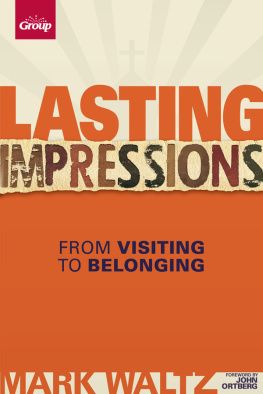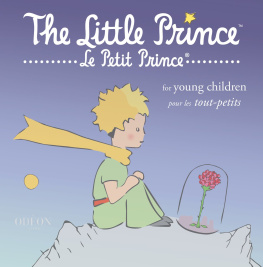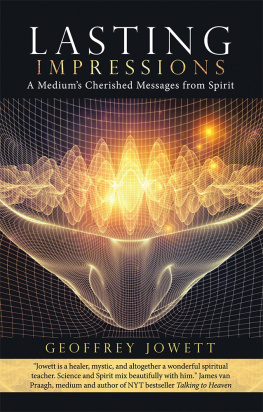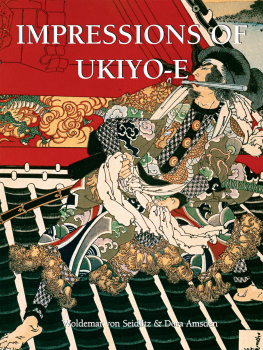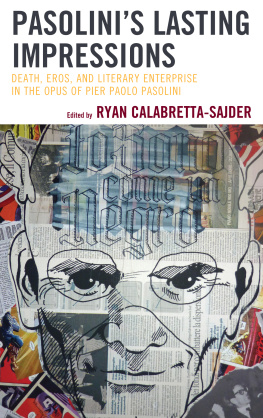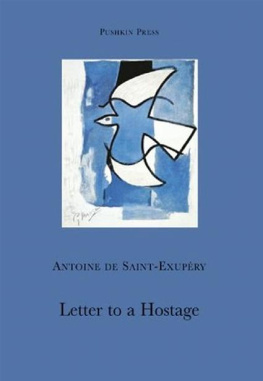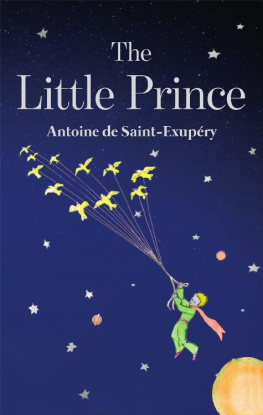LASTING IMPRESSIONS
Selected Essays
V. S. PRITCHETT

For Dorothy
Contents
Preface
When I look back on my seventy years as a writer, I see myself as a traveller not only on the long journeys I have made in Europe and the Americas, but also as a literary journalist. Although I have written long biographical studies of Chekhov, Turgenev and Balzac, I have, as a short story writer, preferred the shorter evocations and I have profited by the discipline imposed by limited space.
This collection of literary essays - my ninth - may appear to be a haphazard journey through different countries and different generations, from Lorca to John Updike, from Browning to Wilde, but my purpose has always been the same: to explore the writers and their intentions.
I should like to thank the editors of the publications in which these pieces first appeared for helping me on my literary travels and for their permission to reprint them here.
Sholom Aleichem
Pain and Laughter
Sholom Aleichem is one of the prolific masters of Yiddish comic storytelling, an art springing from the oral folk traditions of Eastern Europe and crossed by the pain and laughter of racial calamity. Like all comics he is serious, has one foot in the disorder and madness of the world and, as a Jew, the other foot in the now perplexing, now exalted, adjuration of the Law and the Prophets. Did God really choose their fate for the Jewish people? If so, was He being irresponsible, or why doesnt He make it clear? There is no answer. The oppressed stick to their rituals and are obliged to perfect the delights of cunning, the consolations of extravagant fantasy, the ironies and pedantries of the moralist who is privately turning his resignation into a weapon. With so many insoluble dilemmas on his hands, Aleichem developed that nimbleness of mind and fancy, those skills of masking and ventriloquism, that made him the prolific natural in short tales drawn partly from the remaking of folk tradition, a juggler of puns, proverbs, and sudden revealing images caught from the bewildered tongues of his people.
There are certain distinctions to be noted when we speak of the general Jewish gift for anecdote. These are made clear in the exchange of letters between Irving Howe and Ruth Wisse which introduce their selection from a striking variety of Aleichems best work and discuss the growth of mind it reveals. Mr Howe points out that Aleichem is not a folksy tickler of Jewish vanities and the Yiddish folk material he uses is not as cosy as later generations of Jews have liked to suppose. Under the laughter is fright and the old driving forces of anxiety and guilt: if Aleichem is close to folk sources he escapes the collective claustrophobia of a folk tradition that was broken by the pogroms and wars that drove the Eastern European Jews to flight or death; he has let in the light of a complicated and individual vision of human existence. That means terror and joy, dark and bright, fear and play.
Ruth Wisse points to Aleichems position in the period when the Jewish moral crisis came to a head in Eastern Europe. Writing of his contemporaries, the classical masters Mendele Mocher Sforim and I. L. Peretz, she says that they are embattled writers, fiercely critical of their society, strong in dialectical tendency, pitting old against new; whereas Aleichem, who also felt the break in the Jewish tradition and in his own life, makes it his artistic business to close the gap. In fact, wherever the danger of dissolution is greatest, the stories work their magic in simulating or creating a terra firma. I do not know the work of these writers but it is certainly true of Aleichems work that it shows his balance and poise in tales like A Yom Kippur Scandal, Station Baranovich, the terrifying Krushniker Delegation, Eternal Life, and above all in the four grave Tevye tales. As he tries to face his daughters rebellion against tradition Tevye becomes, tragically, something more than a folk figure: he becomes a man.
Aleichem has the style of the spontaneous talker, at home in many garrulous idioms; it is a style that plays as it moves forward dramatically and then, hit by an image or a proverb, circles back. The narrators mind is continually split between what is happening and something else, some fear, some scheme, some hope that is going on in his mind. He acts on impulse and regrets at once; always escaping from his situation, he is back in it only to find it changed, usually for the worse. He writes as a man backing away from the next minute and going headlong into it. Nearly all of Aleichems people are whirled around by their imaginations, addressing fate, knocked this way and then that by scripture or the proverbsWhen a soup bone is stuck in somebodys face who doesnt give it a lick? On second thoughts, You can skin a bear in the forest but you still cant sell its hide there. Speculation is their anguish. They burn with a fever. My blood began to whistle like a teakettle. Aleichems powers of invention pour out of the language he utters. The innumerable surprises of language so entangle us that we are caught out by the vaster surprises of the tale. In catching us out, his art shows its depth.
Aleichems people themselves belong to a storytelling culture. He is as astonished and disturbed by his bizarre tales as we are and uses the device of not bringing them to an end, sometimes in order to show that the meaning of the tale has been hidden and we must work it out for ourselves or go on making it up on our own. This is evidence of a very self-conscious art, as Mr Howe says.
A clear example is A Yom Kippur Scandal. A stranger comes to the synagogue and overcomes mistrust by handing out silver coins, but when the rituals are over, he suddenly screams out that he has been robbed of 1800 roubles, on the holiest day of the year. He had put the money into the praying stand and it has gone. The rabbi and his congregation turn out their pockets. Only one person refuses. He is a young man notorious for knowing the Talmud by heart, for being a master of Hebrew, arithmetic, algebra, unequalled in chessperfection. The congregation argue with him, he begs to be spared, but they throw him to the ground and, going through his pockets discover only a couple of gnawed chicken bones and a dozen plum pits still wet from chewing.
You can imagine what an impression this madeto discover food in the pockets of our prodigy on this holiest of fast days. Can you imagine the look on the young mans face, and on his father-in-laws? And on that of our poor rabbi?
But what about the 1800 roubles? Never found. Gone forever, says the storyteller, and never explains. We can suspect, if we like, that the stranger had invented the drama, to cover up the fact that he had stolen his employers money. But Aleichem does not explain. Why not? Because the deeper sin than the sin of theft is the sin against God and His Law? Aleichem still doesnt say. We are perhaps left to search our own souls. Who knows?
Station Baranovich is another tale that stops short of its ending. It is told by a Jewish stranger on a train and is an event that occurred in czarist times. A loose-tongued bartender called Kivke starts a religious argument with peasants on a Sunday. He is reported to the police and is sentenced to be stripped naked and to run a gauntlet of cavalry officers, who will whip him. The Jews unite to plot his escape. They fake the death of Kivke in prison, arrange a mock funeral, and get him out of the country. He shows his gratitude by blackmailing them for larger and larger sums of money now that he is free. The final threat is to report the whole thing to the Russian Commissioner. But at this point the train stops at Baranovich and the teller of the story jumps out. What happened next, what is the end? the listeners shout. All they get is


